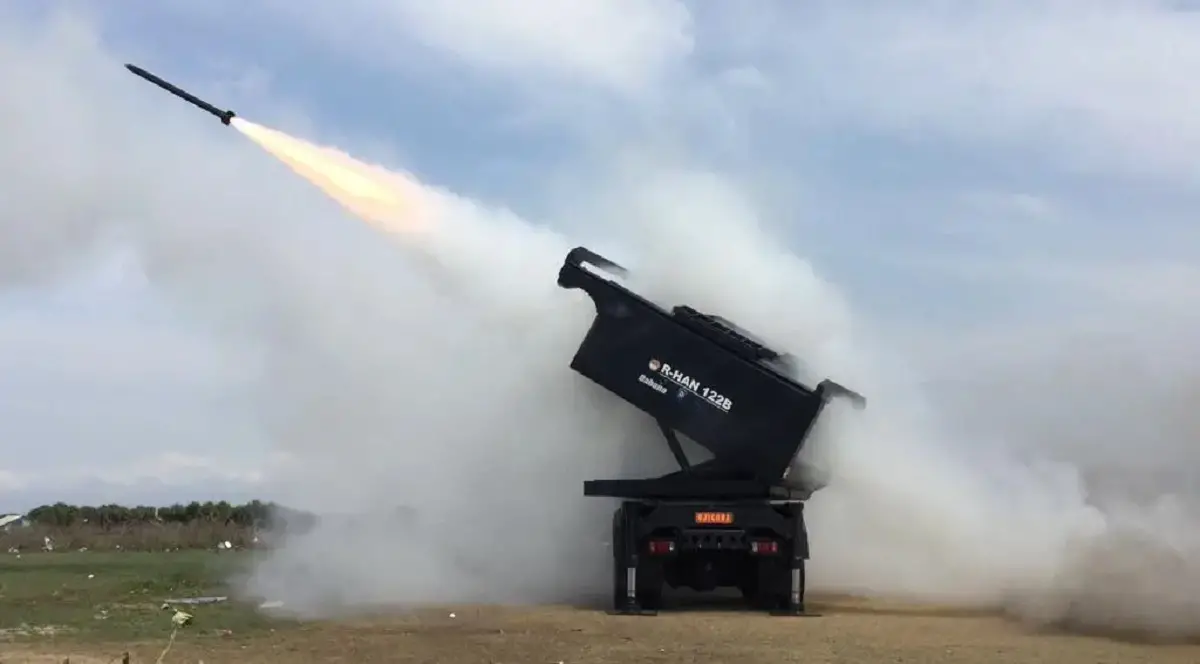The Indonesia Ministry of Defense (MoD) proudly revealed in late October that PT Pindad has successfully completed the development of the highly-anticipated R-Han 122B Multiple Launch Rocket System (MLRS) with maximum speed Mach 2.95 (3,614 km/h; 2,246 mph) and maximum range of 32 km (20 mi). This groundbreaking achievement signals a significant step forward in Indonesia’s efforts to bolster its national defense capabilities. The MoD announced that PT Pindad carried out a rigorous series of trials to ensure the system’s effectiveness and reliability, culminating in the declaration of its development completion. The MoD is now in the process of finalizing contracts for the procurement of R-Han 122B systems and 60 mm mortar ammunition. The R-Han 122B project has been a collaborative effort involving various key players in the Indonesian defense industry. PT Dirgantara Indonesia (PT DI or IAe), the Ministry of Research and Technology, the Ministry of Defense, PT Dahana, and Pindad have worked in unison with the Indonesian Armed Forces to bring this innovative rocket system to fruition.
The genesis of the R-Han 122 dates back to 2007 when the Ministry of Research and Technology established the D-230 Team with the mission to develop a 122 mm diameter rocket with a range of 20 km. This project paved the way for the creation of the D-230 rocket prototype, which was later acquired by the Ministry of Defense and Security to fortify the national defense program. Subsequently, the National Rocket Consortium was formed, with PT DI leading the consortium, aiming to penetrate the mass production of rockets. Within the consortium, PT Pindad played a pivotal role in developing the launch and firing system for the R-Han 122B, employing platforms such as GAZ, Nissan, and Perkasa, modified to accommodate 16 warhead barrels and a mobile launcher. PT Dahana supplied propellants, PT Krakatau Steel contributed to tube materials and rocket structures, while PT Dirgantara Indonesia spearheaded the design and flight distance testing. The Meteorology, Climatology, and Geophysical Agency (BMKG) joined as well, providing essential tools for tracking the rocket’s trajectory.

Originally named the D-230, the rocket system was later rebranded as the R-Han 122 after its design was acquired by the Ministry of Defense. One of the key challenges the researchers faced was perfecting the thermal insulation system for the rocket. High launch temperatures, reaching up to 3,000 °C, presented a serious risk to the rocket’s operators. Through diligent efforts and material changes, such as utilizing lightweight aluminum for rocket construction and implementing rubber or polymer for thermal insulation, they successfully developed a robust and reliable rocket system. A significant milestone in the R-Han 122B’s development occurred on November 6, 2010, when a firing test was conducted in Baturaja, South Sumatra. The R-Han 122B rocket program, commenced in 2014 and marked a critical turning point in the project’s evolution. In June 2015, the rocket underwent its first dynamic test, followed by a second test in August of the same year, during which six rockets were fired using an Indonesian Marine Corps’ RM 70 multiple launch rocket system.
The Indonesian Marine Corps currently operates two types of 122 mm BM-21 Grad multiple launch rocket systems (MLRS): RM-70 Grad and Type 90B MLRS. Czech-made RM-70 Grad acquired around 2003 and new RM-70 Vampire acquired in 2016. The Type 90B is a 122 mm multiple rocket launcher (SPMRL) produced by the People’s Republic of China. In 2019, the Indonesian Ministry of Defense and PT Delimajaya Group launched a program to develop an upgraded version of the R-Han 122 rocket launcher vehicle. The BM-21 “Grad” (hailstorm) is a self-propelled 122 mm multiple rocket launcher designed in the Soviet Union. Since its introduction in the early 1960s, the presence and use of 122 mm type multi barrel rocket launchers has become ubiquitous in conflict zones throughout the world. Its simplicity, combined with the ability to deliver massive firepower from a relatively light mobile platform, has led to its rapid, widespread adoption. This weapon system has been widely copied, and now copies, variants, and derivatives can be found in the inventories of over 50 state armed forces, as well as numerous non-state armed groups












